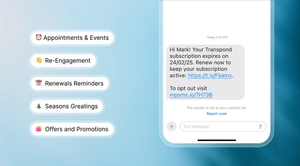First impressions start in the inbox.
That old free Gmail address might still work… but it’s quietly hurting your brand.
Still using a free Gmail account for your business? It’s time for an upgrade. A professional email address gives you credibility, security, and control: everything free inboxes lack.
We’ve rounded up the best email hosting providers for small businesses in September 2025, with clear pricing and key features to help you choose the right fit.
Why email hosting services are so important
Email hosting is all about building trust and keeping communication secure. And when you open your inbox right now, most professional messages you see come from hosted business domains. What are its benefits?
- Professional image: An address like john.doe@acme.com instantly looks credible, unlike johndoeacme@yahoo.com.
- Security and compliance: Paid plans include enterprise-grade spam filtering, malware protection, and encryption. For industries like healthcare, HIPAA-compliant hosting is non-negotiable.
- Reliability: Business hosting guarantees uptime and consistent access to your email, even during spikes in activity.
- Scalability and storage: As your team grows, you can add accounts and expand storage without managing servers yourself.
- Collaboration tools: Many providers bundle calendars, contacts, and file sharing to simplify teamwork.
- User management and support: You control access through admin tools and get responsive, human support when needed.
Most providers offer these basics, but the real difference lies in pricing, scalability, and performance, especially if you manage multiple mailboxes.
How to choose an email host
In 2025, business email hosting options range from simple IMAP mailboxes to full productivity suites with calendars, chat, and collaboration tools. Before you decide, review what really matters (and what’s just a bonus).
Must-haves (non-negotiables)
These are the essentials every small business should look for:
- Scalability. Affordable entry-level plans with the flexibility to add users or upgrade storage as your team grows.
- Security and privacy. Built-in spam filtering, malware protection, encryption, and two-factor authentication. Bonus points for providers operating under EU/Swiss privacy laws.
- Reliability and uptime guarantees. At least 99.9% uptime with clear SLAs so you can depend on consistent access.
- Support and ease of use. Responsive customer service and migration assistance if you’re switching from another host.
- Storage and attachments. At least 10 GB per user (preferably 30 GB+) if your business handles large files or frequent attachments.
Nice-to-haves (depends on your needs)
These features can enhance productivity but aren’t essential for everyone:
- Productivity suite integration. Calendars, file storage, and video calls.
- Shared inboxes or team collaboration tools: Useful for customer support or marketing teams.
- Advanced admin controls: Centralized account management, role-based permissions, and reporting dashboards.
- Regional data centers: Choose this if compliance or data residency is a priority.
- AI-powered tools: Some modern platforms include smart replies, email scheduling insights, or spam learning algorithms.
Once you’ve outlined your must-haves, compare plans side by side; not just for price, but for how they fit your current workflows and growth plans.
PS. If you need a way to sell and market, not just communicate, Transpond is a capable email marketing platform that integrates seamlessly with Capsule CRM.
Best email hosting solutions for small businesses
Google Workspace (Gmail for Business)
Google Workspace is one of the most popular options for small businesses thanks to its low entry price point and rich feature set.
Pricing plans (billed annually with a 16% discount):
- Starter, at $6.30 per user per month
- Standard, at $12.60 per user per month
- Plus, at $22 per user per month
- Enterprise with custom pricing
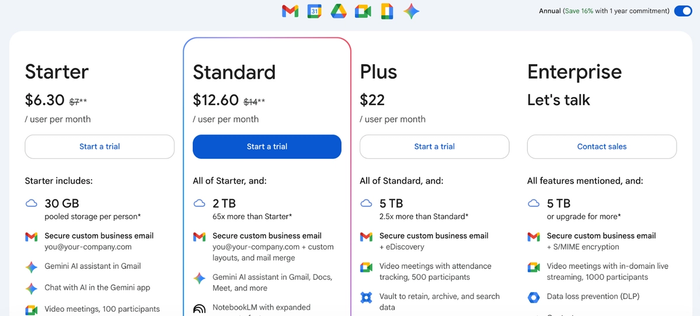
Every plan includes Gmail, Drive, Calendar, Chat, and Meet, with a 99.9% uptime guarantee.
Key features
- Professional email on your own domain with Gmail’s familiar interface
- Collaboration tools like Docs, Sheets, Calendar, and Meet, all accessible across devices
- Spam filtering, two-factor authentication, and strong admin controls
- 30 GB to 5 TB of storage per user, depending on the plan
Pros
- Smooth integration with Google’s productivity apps
- Simple onboarding for teams already using free Gmail accounts
- Robust security and centralized admin controls
Cons
- Subscription costs scale quickly as you add users
- Limited flexibility outside Google’s ecosystem
Best for:
Small businesses that value simplicity, collaboration, and familiarity. Ideal for teams that already rely on Google tools like Docs and Sheets and want a trusted all-in-one environment.
Hostinger
Hostinger’s business email hosting offers one of the best solutions for a competitive price in the market.
Pricing plans
- Business Starter, at $2.99 per user per month
- Business Premium, at $5.99 per user per month
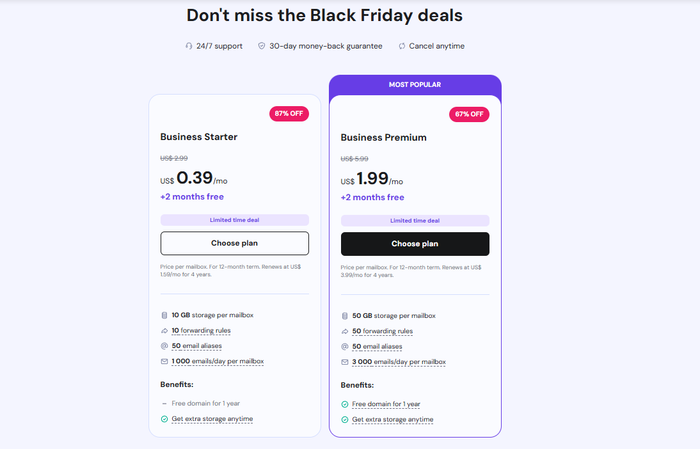
Every plan includes a free domain for 1 year, 50 email aliases, and at least 1000 emails/day per inbox.
Key features
- Auto-replies for when you are away and want to respond
- Audit logs to track all mailbox activity
- End-to-end encryption to keep the data safe
- Catch emails sent to mistyped addresses
- Integration with Outlook, Gmail, CRM tools, and more
Pros
- Relatively cheap with a 30-day money-back guarantee
- Easy setup and migration
- Advanced security for your email
- 24/7 support to assist you
Cons
- Offers only two plans, which are not super flexible
- Storage per mailbox might be lacking for some users
Best for:
Individuals and small businesses that want a user-friendly platform and excellent value for the money spent.
Microsoft 365 (Exchange Online)
Looking for an email host that fits naturally into the Microsoft tools you already use? Microsoft 365 combines Exchange email with Office apps such as Outlook, Teams, Word, and Excel — making it a solid choice for many small and midsize businesses.
Pricing (per user/month):
- Exchange Online Plan 1: $4 50 GB mailbox
- Plan 2: $8; 100 GB mailbox and 150 MB attachments
- Business Standard: $12.50; everything from Plan 2 plus Office apps and Teams
- Business Standard (no Teams): $10.25
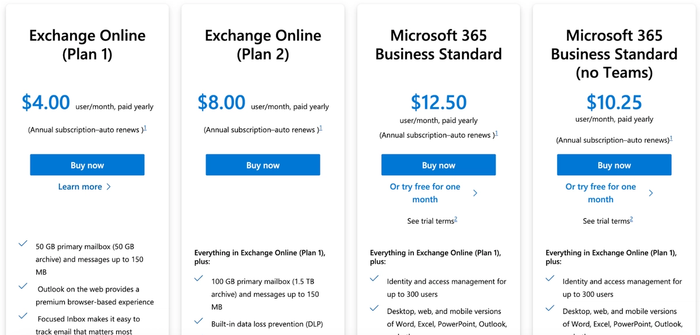
Key features
- Custom domain email via Exchange, accessible across web, desktop, and mobile
- Advanced security: anti-spam, anti-malware, encryption, and eDiscovery
- Tight integration with Microsoft Office apps and Teams
- 99.9% uptime SLA and 24/7 customer support
Pros
- Familiar Outlook experience with seamless Office integration
- Enterprise-grade security and compliance (GDPR, DLP, HIPAA)
- Generous mailbox sizes (50–100 GB)
Cons
- Higher learning curve for new users
- Licensing structure and plan names can be confusing
Best for
Businesses that already rely on Microsoft tools for daily operations or need strict compliance and strong data protection. A solid pick for B2B teams that want everything (email, meetings, and files) under one Microsoft roof.
Zoho Mail (Zoho Workplace)
Zoho is mainly known for its all-in-one business tools (CRM, invoicing, and help desk software), but it also offers Zoho Mail, a privacy-focused email hosting service that fits neatly into the same ecosystem.
It includes a forever-free plan for up to five users (5 GB per user), which works well for freelancers or very small teams. Paid tiers expand both mail and file storage:
- Mail Lite: €0.90/user/month,5 GB mail storage, unlimited seats
- Mail Premium: €3.60/user/month, 50 GB mail storage
- Workplace Standard: €2.70/user/month, 30 GB mail + 100 GB file storage
- Workplace Professional: €5.40/user/month, 100 GB mail + 1 TB file storage
- Workplace Enterprise: custom pricing with advanced identity management
All plans include Zoho WorkDrive, Calendar, and ToDo, while Directory and eProtect appear in higher tiers.
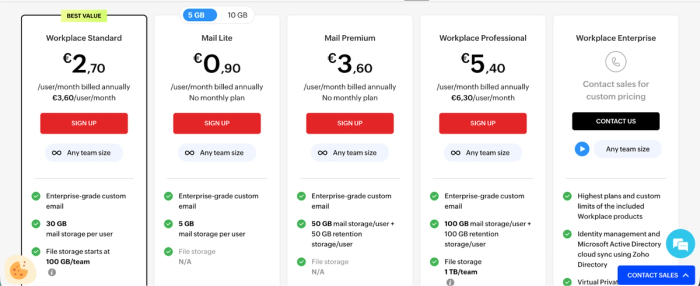
Key features
- Ad-free email hosting integrated with Zoho Workplace
- Built-in AI assistant to suggest replies and manage tasks
- Free plan for up to five users
- Multi-region data centers for performance and privacy
Pros
- Competitive pricing and flexible entry-level options
- Simple, intuitive interface that’s easy to onboard
- Integration with Zoho’s wider suite of business tools
Cons
- Some advanced features (like eDiscovery) are limited to higher tiers
- Occasional performance dips and smaller storage caps on free plans
Best for
Small businesses already using Zoho apps or looking for an affordable, ad-free email solution that covers the essentials.
Proton Mail (Proton Business)
When privacy tops your priority list, Proton Mail stands out as the go-to option. Built and hosted in Switzerland, it’s governed by some of the world’s strongest privacy laws and uses end-to-end encryption to secure every message.
Proton offers plans for individuals, families, and businesses, but only business plans include admin controls and multiple user management. There’s no free tier for Proton Business, though a 14-day trial is available.
Pricing (per user/month):
- Mail Essentials: €6.99, 15 GB mail storage, 10 addresses per user
- Mail Professional: €9.99, 50 GB mail storage, 15 addresses per user
- Proton Business Suite: €12.99, 1 TB storage, full productivity suite, Optional add-ons: Proton VPN (€6.99), Proton Pass (€1.99), Proton Drive (€7.99 for 1 TB).
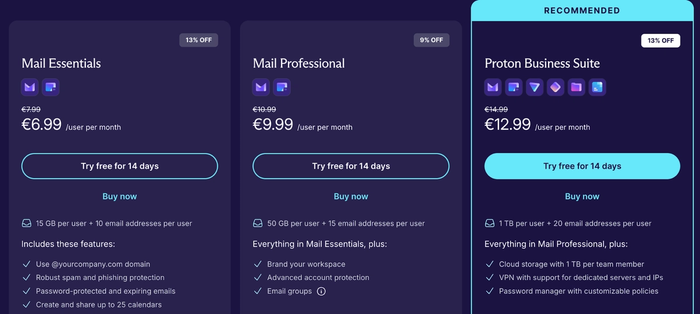
Key features
- End-to-end encryption with open-source cryptography
- Self-destructing messages and metadata protection
- Swiss-based data centers under strict privacy regulation
- Bridge app for using Proton Mail with Outlook or Apple Mail
Pros
- Unmatched privacy and security credentials
- No ads, tracking, or data mining
- Anonymous sign-up option for extra discretion
Cons
- No free plan for business use
- Some encryption options (like subject-line protection) are not standard
- Requires the Bridge app for third-party mail clients
Best for
Businesses handling sensitive communications or operating in regulated industries that require airtight privacy, secure hosting, and multiple addresses per user.
IONOS Mail and Microsoft Exchange
Want a professional email address for just a few dollars a month? IONOS Mail delivers exactly that: affordable business email hosting with the flexibility to add Microsoft Exchange if you need more power later on.
Pricing (per account/month):
- Mail Basic 1: $1.10, 2 GB storage
- Mail Basic 25: $2 25 accounts, 2 GB storage each
- Mail Business: $3 — 50 GB storage per user (five users cost $22 total) These prices require a three-year contract.
Exchange users can access additional features such as Microsoft-preferred architecture, geo-redundant setup, and multiple domain controllers for $4.50 per user/month (one-year term). You can also bolt on Microsoft 365 or Google Workspace for just $1 per user/month.
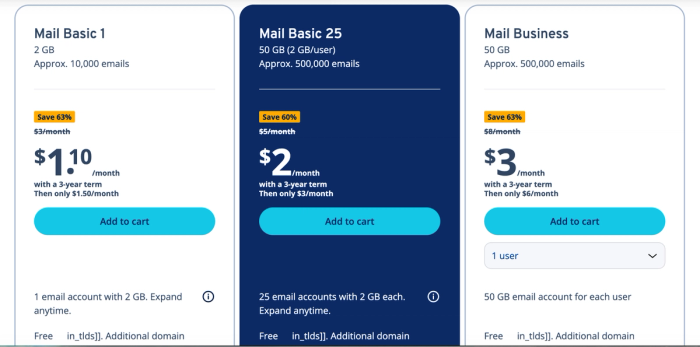
Key features
- Custom domain with free registration included
- Spam and virus filtering, plus scheduling and email templates
- Shared calendars and contacts in Exchange plans
- 24/7 support and integration with the IONOS website builder
Pros
- Some of the lowest-priced business mailboxes available
- Easy upgrade path to Exchange or 365 without switching providers
- Domain hosting and email are bundled under one roof
Cons
- The control panel can feel dated and unintuitive
- Premium features require commitment to higher tiers or add-ons
Best for
Businesses that want cheap, reliable email hosting tied to their domain, with the option to expand into Exchange or Microsoft 365 when collaboration needs grow.
Fastmail
If you want to move away from big ecosystems like Google or Microsoft but still expect reliability, Fastmail offers a clean, privacy-focused alternative. It combines custom domain email and strong security: all without ads, tracking, or unnecessary add-ons.
Fastmail supports business accounts with custom domains. Its privacy stance and minimalist design make it a favorite among teams that value simplicity.
Pricing (per user/month):
- Basic: $3, 5 GB email, 1 GB file storage
- Standard: $5, 50 GB email, 10 GB file storage
- Professional: $9, 100 GB email, 50 GB file storage
Only the Standard and Professional tiers allow integration with third-party apps like Outlook or Apple Mail. The Professional plan also includes email retention and compliance features.
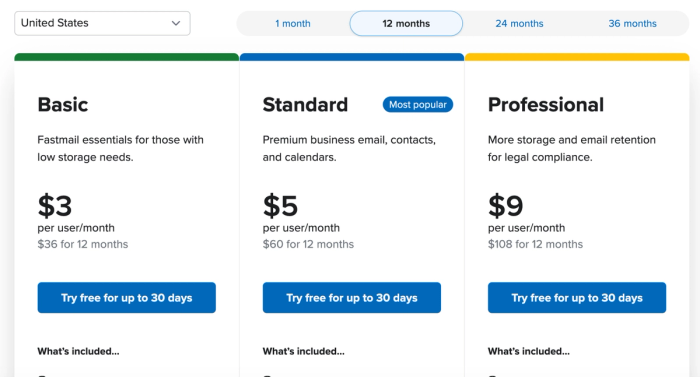
Key features
- Custom domain support with modern web and mobile apps
- Advanced search and filtering with JMAP protocol support
- Masked email addresses to protect your primary identity
- Built-in calendar, contacts, and file storage tools
Pros
- Fast, intuitive interface with a strong focus on productivity
- Great privacy and no ad-tracking policies
- Reliable uptime and responsive customer support
Cons
- Pricier per user than budget-focused hosts
- No built-in office suite or deep collaboration features
Best for
Small teams and professionals who want a private, fast, and uncluttered email host with the essentials covered, and none of the ecosystem lock-in.
Rackspace Email
When uptime and real human support matter more than flashy features, Rackspace Email is a solid choice. It’s built for businesses that can’t afford downtime, with a 100% uptime guarantee and 24/7 support from real people, not bots. Despite being more enterprise-leaning, its entry price makes it accessible for small businesses, too.
Rackspace keeps things simple with one core plan and a couple of optional upgrades.
Pricing (per mailbox/month):
- Standard mailbox: $2.99 — 25 GB mailbox, 30 GB file storage
- ActiveSync add-on: +$1 — shared calendars, contacts, and Microsoft Office app compatibility
- Advanced security add-on: +$3 — attachment scanning, unlimited storage, and email retention for compliance-heavy sectors
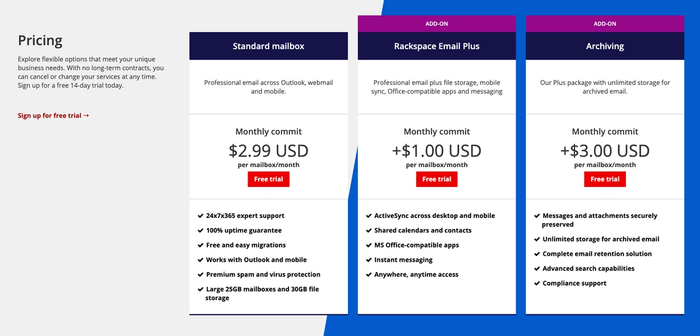
Key features
- Business email hosting with optional shared calendar and contact tools
- Compliance with HIPAA and SOC 2 standards
- 100% uptime guarantee and 24/7/365 live support
- Optional archiving, retention, and Exchange add-ons
Pros
- Enterprise-grade reliability and security for a small-business price
- Generous storage allocation for base plans
- Excellent support and compliance coverage for regulated industries
Cons
- More complex setup compared with lighter hosts
- Tailored more toward mid-size businesses; it may be too robust for solo users
Best for
Small and mid-size businesses in regulated industries such as finance or healthcare that value compliance and hands-on support over extensive integrations or productivity add-ons.
Greatmail
When all you want is solid email hosting on US-based servers, Greatmail delivers exactly that. Founded in 2003, it’s one of the few providers that focus purely on email.
Pricing (per mailbox/month, minimum 5 users):
- Standard: $1.95 — 10 GB mailbox storage
- Groupware: $3.95 — 25 GB mailbox storage plus shared calendars and contact sync
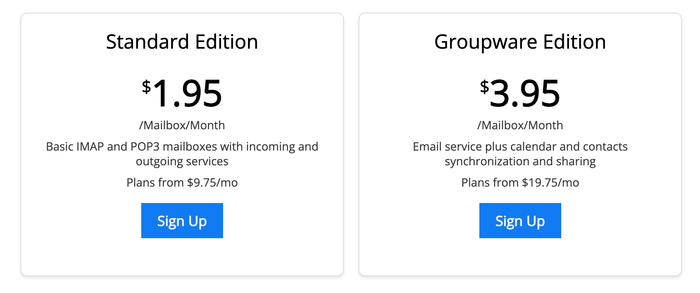
Key features
- IMAP/POP email hosting with custom domain and multi-domain support
- Shared calendars and contact sync in the Groupware plan
- SPF, DKIM, and DMARC support for high deliverability
- Migration assistance and responsive admin support via phone or ticket
Pros
- Low entry price and flexible mailbox options
- Strong focus on email deliverability and security protocols
- US-based data centers for businesses that require domestic hosting
Cons
- Basic interface without collaboration tools or modern design
- A minimum five-seat purchase may not suit freelancers or very small teams
Best for
Small businesses that want reliable, inexpensive IMAP hosting without productivity suites: just dependable email that does what it’s supposed to.
Mailbox.org
When privacy and independence from big tech are non-negotiable, Mailbox.org stands out as a trustworthy choice. Based in Germany, it’s known for its commitment to data protection, transparency, and green infrastructure; without leaning on Google Workspace or Microsoft 365. Migration is straightforward, there are no ads, and every plan operates under strict German and EU privacy laws.
Pricing (per user/month):
- Light: €1, 2 GB of email storage
- Standard: €3, 10 GB of mail and 5 GB of file storage
- Premium: €9, 25 GB of mail and 50 GB of file storage
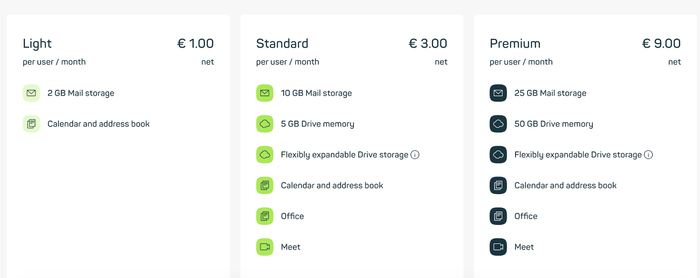
Key features
- Custom domain hosting with built-in office suite and video conferencing
- End-to-end PGP encryption and ISO 27001-certified data centers
- 100% renewable energy operations and GDPR-compliant policies
Pros
- Exceptional privacy standards and full data sovereignty within the EU
- Integrated productivity tools and collaboration features
- Transparent, ad-free environment focused on security
Cons
- Interface feels dated compared to slicker alternatives
- Pricing can add up for larger teams or heavy storage users
Best for
Privacy-conscious small businesses that value security and European data hosting, but with enough collaboration tools to replace mainstream ecosystems.
Conclusion
At first glance, most email hosting services look the same: similar prices, familiar promises, identical checklists of features. But once you dig in, real differences emerge: some prioritize privacy, others collaboration or scalability.
The best choice depends on what you value most, but one thing’s certain. Anything beats using a free, generic email address if you want customers and partners to take you seriously.
Once your communication is set up, it’s time to connect it to the bigger picture. Capsule CRM lets you link every email, contact, and interaction, so you can nurture leads, close deals, and run segmented campaigns… all in one place.
Start for free and give your communication the structure it deserves.




